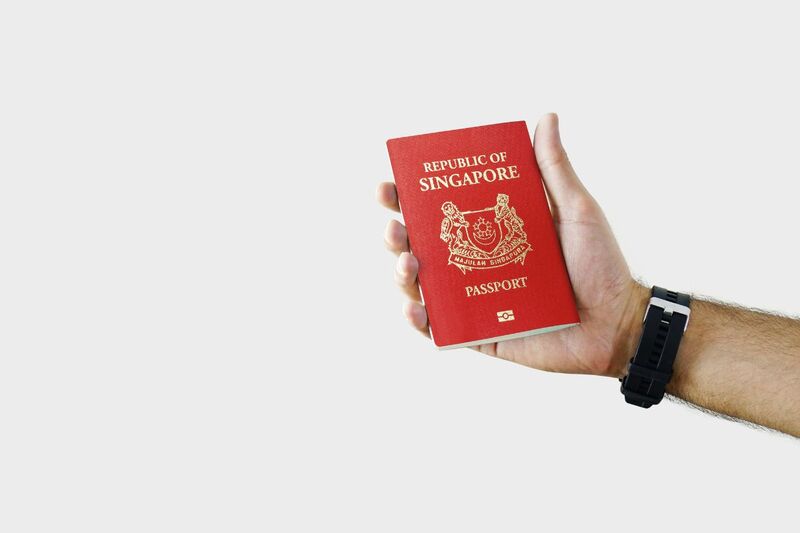Singapore Still Has the World’s Most Powerful Passport — What It Means for Global Talent Mobility

This article is written in English for readers in Singapore. Chinese and Japanese translations are available on our website.
Singapore Tops the World Again for Passport Power
For the sixth consecutive year, Singapore has been ranked the world’s most powerful passport by the Henley Passport Index 2025, granting visa-free or visa-on-arrival access to 194 destinations worldwide.
This milestone reaffirms Singapore’s position not only as a global travel hub, but also as one of the most open economies for international talent mobility and business connectivity.
According to the Ministry of Manpower (MOM), Singapore currently hosts more than 7,000 multinational companies and 1.5 million foreign professionals, managers, and executives (PMEs). Schemes like the Overseas Networks & Expertise (ONE) Pass and Tech.Pass are further strengthening the country’s reputation as Asia’s preferred base for regional leadership roles.
1. Mobility Advantage Fuels Cross-Border Careers
Singapore’s top ranking on the Henley Index reflects not only freedom of travel but also credibility in global talent circulation.
Professionals with Singaporean or long-term residency status enjoy smoother visa access to major economies such as Japan, the UK, and the US — facilitating international assignments, regional client work, and academic exchange.
What this means for employers:
Companies can use Singapore’s strong passport credibility to attract and deploy regional managers faster, without lengthy visa processing. This shortens hiring cycles and improves cross-border project readiness.
2. ONE Pass and Tech.Pass Expand Leadership Pipelines
The ONE Pass, introduced by MOM in 2023, continues to draw senior professionals earning S$30,000 or more per month or those with outstanding global achievements.
The Tech.Pass, managed by the Economic Development Board (EDB), targets founders, researchers, and technical experts in AI, data, and engineering.
Together, these schemes bridge Singapore’s local-global talent mix, allowing firms to blend homegrown expertise with international best practices.
What this means for employers:
These initiatives reduce skill gaps in advanced sectors and promote knowledge transfer across teams. For candidates, they signal Singapore’s long-term openness to globally mobile professionals seeking stability, safety, and high living standards.
3. Expat-Friendly Ecosystem Reinforces Retention
Beyond entry policies, Singapore’s infrastructure continues to strengthen its appeal to expatriates.
Mercer’s Quality of Living Index 2025 ranks Singapore as Asia’s #1 expat destination, citing safety, education, and healthcare.
Flexible relocation schemes, family-friendly tax incentives, and a bilingual workforce make the country an ideal base for multinational headquarters.
What this means for employers:
Attracting global leaders is no longer enough — retention now depends on holistic relocation support. Companies offering family, schooling, and housing guidance enjoy 25% higher retention among senior expatriates (MOM-EDB survey, 2025).
4. Singapore as ASEAN’s Mobility Anchor
Singapore’s strategic location and strong diplomatic ties with ASEAN partners are cementing its role as the “mobility anchor” of Southeast Asia.
Under the ASEAN Mutual Recognition Arrangements (MRAs), professional qualifications in engineering, accountancy, and healthcare are recognised across member countries — with Singapore often leading skill certification exchanges.
What this means for employers:
Firms headquartered in Singapore can scale operations regionally with less administrative friction. For jobseekers, this means greater career movement within ASEAN while retaining Singapore as a professional home base.
How Reeracoen Supports Global Talent Mobility
At Reeracoen Singapore, we bridge regional and international career opportunities by:
- Connecting high-skill candidates to roles aligned with One Pass and Tech.Pass criteria.
- Advising employers on global mobility and expatriate hiring frameworks.
- Offering onboarding and retention playbooks to help companies integrate foreign leaders effectively.
- Providing country-to-country talent insights across ASEAN and Japan through our APAC Workforce Whitepaper 2025.
Whether you’re building a regional HQ or seeking an overseas role, our consultants specialise in helping professionals and employers navigate the evolving landscape of cross-border hiring.
🔍 FAQ: Singapore Passport & Global Hiring
Q1. Why does Singapore rank first on the Henley Passport Index?
Because of its visa-free access to 194 destinations and strong diplomatic relationships worldwide.
Q2. How does the ONE Pass benefit companies?
It enables firms to hire senior foreign professionals more easily and promotes cross-border leadership exchange.
Q3. What industries are seeing the most international hiring?
Technology, finance, and sustainability — sectors that require global collaboration and specialised expertise.
Q4. Can local professionals also benefit from Singapore’s mobility strength?
Yes. Singaporeans and PRs enjoy smoother visa access for overseas assignments and training, enhancing long-term career competitiveness.
💼 For Employers: [Book a Consultation — Attract and retain global talent with Reeracoen Singapore.]
👩💼 For Jobseekers: [Submit Your CV — Explore regional and overseas opportunities with our consultants.]
✅ Final Author Credit
By Valerie Ong (Regional Marketing Manager, Reeracoen Singapore)
Published by Reeracoen Singapore — a leading recruitment agency in APAC.
Related Articles:
- [Top 10 Hiring Trends to Watch in 2026 (Singapore)]
- [Salary & Benefits 2026: What Singapore Employers Should Budget For]
- [AI in Hiring: Policy, Bias & Practical Guardrails for HR]
📚 References
- Henley Passport Index 2025 – Singapore Ranked #1 with Access to 194 Destinations
- Ministry of Manpower Singapore – Overseas Networks & Expertise Pass (ONE Pass)
- Singapore Economic Development Board – Tech.Pass Programme
- Mercer Quality of Living Survey 2025 – Asia Rankings
- ASEAN Mutual Recognition Arrangements (MRAs)

Disclaimer:
The information provided in our blog articles is intended for general informational purposes only. It is not a substitute for professional advice and should not be relied upon as such.
While we strive to provide accurate and up-to-date information, the ever-evolving nature of certain topics may result in content becoming outdated or inaccurate over time. Therefore, we recommend consulting with qualified professionals or experts in the respective fields for specific advice or guidance. Any actions taken based on the information contained in our blog articles are solely at the reader's discretion and risk. We do not assume any responsibility or liability for any loss, damage, or adverse consequences incurred as a result of such actions.
We may occasionally provide links to external websites or resources for further information or reference. These links are provided for convenience and do not imply endorsement or responsibility for the content or accuracy of these external sources. Our blog articles may also include personal opinions, views, or interpretations of the authors, which do not necessarily reflect the views of our organisation as a whole. We encourage readers to verify the accuracy and relevance of information presented in our blog articles and to seek professional advice when needed. Your use of this website and its content constitutes acceptance of this disclaimer.





